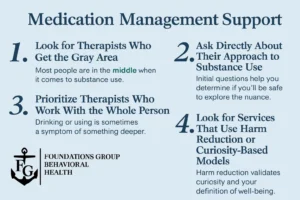You don’t need to hit rock bottom to want change.
You don’t need a label to want support.
And you definitely don’t need judgment from someone who’s supposed to help.
Maybe you’re rethinking your relationship with alcohol. Maybe you’re wondering if “just a few edibles a week” is affecting your mood more than you expected. Or maybe you’re not planning to quit anything—you just want a therapist who won’t flinch when you bring it up.
This is what it means to be sober curious—and it’s more common than you think.
At Foundations Group Behavioral Health, we talk to people every day who are asking these questions. You don’t have to commit to sobriety to deserve support. You just have to want something different.
1. Look for Therapists Who Get the Gray Area
Most people aren’t all-in or all-out when it comes to substance use. They’re in the middle—questioning, experimenting, pausing.
But not all therapists know how to hold that middle space. Many are trained to see substance use through an addiction lens only. That can lead to:
- Over-pathologizing casual or experimental use
- Minimizing emotional patterns that do matter
- Creating shame where there should be curiosity
When seeking mental health services in Cape Cod, ask whether the providers are familiar with sober curiosity, harm reduction, or moderation support. You want someone who honors questions, not just answers.
2. Ask Directly About Their Approach to Substance Use
You don’t have to wait until session three to bring it up. In fact, your initial inquiry is a great place to ask questions like:
- “Do you work with people who are sober curious?”
- “How do you approach substance use in therapy if someone isn’t looking to quit entirely?”
- “Have you worked with clients who explore moderation or take breaks from drinking?”
Pay attention not just to their words, but to their energy. Are they open? Curious? Defensive? Neutral? Their response tells you whether you’ll be safe to explore the nuance.
A good therapist won’t assume you’re in denial just because you haven’t hit rock bottom.
3. Prioritize Therapists Who Work With the Whole Person
Sometimes, drinking or using is a symptom of something deeper. Anxiety. Loneliness. Trauma. Burnout. Even boredom.
That’s why it’s important to find a provider who offers mental health services that include more than just substance assessments. Your therapist should be able to help you:
- Explore your emotional patterns without shame
- Understand how stress, relationships, or depression affect your habits
- Develop tools that support wellbeing—whether or not you change your use
Sober curiosity is often a sign of deeper emotional insight. Honor that by choosing care that’s holistic, not just behavior-focused.
4. Look for Services That Use Harm Reduction or Curiosity-Based Models
If you’re looking for Mental Health Services in Barnstable County MA, consider asking about harm reduction or curiosity-driven models of care.
These approaches:
- Respect that sobriety is a valid choice—but not the only choice
- Center your goals and your definition of wellbeing
- Acknowledge the role substances may play in coping, identity, or connection
Therapists trained in these models won’t shame you. They’ll explore with you.
5. Don’t Ignore the Vibe—Your Gut Matters
Let’s be real: Even the most credentialed therapist won’t help if you don’t feel safe with them.
In your first session (or even phone call), notice:
- Do you feel heard, or talked over?
- Do they ask thoughtful questions, or jump to conclusions?
- Do they seem rigid about what “success” looks like?
You don’t have to feel 100% comfortable (therapy gets vulnerable fast). But you should feel like your identity, values, and voice are welcome.
6. Understand That Mental Health and Substance Use Are Intertwined
Maybe you’ve been feeling more anxious lately. Or sad in a way that sneaks up on you. Or irritable all the time. And you’ve started to wonder: Is this related to my drinking?
Or is the drinking because I feel this way?
The answer might be: both.
That’s why finding the right mental health services matters. You want care that can explore these tangled threads without jumping to judgment or pushing a strict agenda.
7. Choose Local Providers Who Know the Culture
Cape Cod is a beautiful place—but it can also be isolating, seasonal, and heavily influenced by social drinking norms.
Finding a provider who understands your environment matters. If you’re looking for Mental Health Services in Falmouth MA, seek someone who gets the local pressures:
- Happy hour culture
- Tourist-season burnout
- Quiet winter loneliness
- Family dynamics that may include hidden substance struggles
You don’t need to explain the whole Cape Cod culture to your therapist. They should already know—and support you within it.
8. Know You Can Change Direction at Any Time
Maybe you start therapy wanting to explore moderation… and end up choosing sobriety. Maybe you take a break from drinking, feel better, and want to keep going. Or maybe you try therapy and realize you need something else entirely.
The right provider won’t trap you in a treatment box. They’ll adapt with you.
Therapy should never feel like pressure. It should feel like possibility.
FAQ: Mental Health Services and Sober Curiosity
What if I’m not ready to quit drinking—can I still see a therapist?
Absolutely. You don’t have to commit to any specific goal to begin therapy. Curiosity is a powerful reason to seek support.
Will a therapist pressure me into sobriety?
Not if you find the right one. A good therapist listens first, supports second, and never pushes an agenda. Your goals are what matter most.
Is sober curiosity a real thing?
Yes. Many people today are questioning their relationship with alcohol or substances without identifying as “addicted.” It’s a valid, important form of self-awareness.
Do I need a diagnosis to start mental health services?
No. At Foundations Group, we welcome people at all stages—whether you’re managing symptoms or simply seeking clarity.
How can I tell if a therapist is judgment-free?
Start by asking about their experience with substance use. Pay attention to whether they’re curious, neutral, or dismissive. And trust your gut.
Do you offer virtual sessions?
Yes, we offer flexible therapy options for residents across Cape Cod, including virtual mental health services to fit your schedule and comfort level.
Final Thought: You’re Allowed to Explore
You’re allowed to question your habits without justifying them.
You’re allowed to want clarity without committing to a label.
You’re allowed to look for help that doesn’t ask you to fit someone else’s box.
At Foundations Group, we see sober curiosity as a strength—not a warning sign. And our therapists are here to support whatever direction your exploration takes you.
Because sometimes, the bravest thing isn’t quitting.
It’s asking, “Is this still working for me?”
Ready to find mental health care that honors your voice?
Call 888-685-9730 to learn more about our Mental Health Services in Cape Cod, MA.









